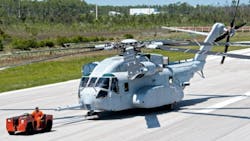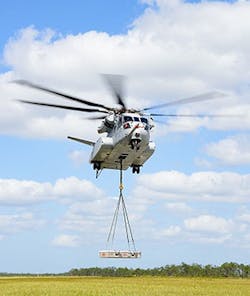Sikorsky Heavy-Lift Helo Successful in Flight Test
Lockheed Martin reported that its CH-53K helicopter passed an important test in the aircraft’s development, the first external lift flight, successfully carrying a 12,000-lb. external load. "Achieving our first external lift signifies another milestone for the CH-53K program," stated Mike Torok, vice president for the Sikorsky CH-53K programs.
Defense giant Lockheed acquired Sikorsky from United Technologies Corp. in 2015 in a $9-billion deal.
"Our flight envelope expansion efforts remain on track, and we continue to make good progress toward our initial operational test assessment later this year, and ultimately full aircraft system qualification," Torok continued.
The Sikorsky CH-53K “King Stallion” is a heavy-lift cargo helicopter being developed for the United States Marine Corps. The Corps has ordered 200 of the helicopters at a reported price of $25 billion. The aircraft is designed with three 7,500-shp engines, new composite rotor blades, and a wider cabin than earlier CH-53 models.
The helicopters are on target to complete development and deployment in 2018.
The first two CH-53K heavy lift helicopters achieved their first flights in October 2015 and January 2016, respectively. According to the OEM, these helicopters together have achieved over 50 flight hours, including one flight at speeds over 140 knots.
The CH-53K King Stallion is equipped with single, dual, and triple external cargo hook capability that will allow for transfer of three independent external loads to three separate landing zones, in support of distributed operations in a single sortie, without having to return to a ship or other logistical hub. The three external cargo hooks include a single center-point hook with a 36,000-lb. capability and dual-point hooks each capable of carrying up to 25,200 lbs. The system has electrical load-release capability from the cockpit and cabin, and mechanical load-release capability at each of the pendant locations.
An auto-jettison system is incorporated to protect the aircraft in the event of a load attachment point failure.
A third and fourth King Stallion aircraft will join the flight test program this summer. As the tests proceed, the two current flying aircraft will have their external-load envelopes expanded: Initial external payloads weighing 12,000 lb will be flown first in hover, and then incrementally to speeds up to 120 knots. Then, the aircraft will carry 20,000- and 27,000-lb. external payloads.
About the Author
Robert Brooks
Content Director
Robert Brooks has been a business-to-business reporter, writer, editor, and columnist for more than 20 years, specializing in the primary metal and basic manufacturing industries. His work has covered a wide range of topics, including process technology, resource development, material selection, product design, workforce development, and industrial market strategies, among others. Currently, he specializes in subjects related to metal component and product design, development, and manufacturing — including castings, forgings, machined parts, and fabrications.
Brooks is a graduate of Kenyon College (B.A. English, Political Science) and Emory University (M.A. English.)

